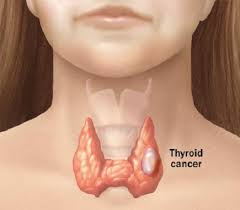- Home
- Editorial
- News
- Practice Guidelines
- Anesthesiology Guidelines
- Cancer Guidelines
- Cardiac Sciences Guidelines
- Critical Care Guidelines
- Dentistry Guidelines
- Dermatology Guidelines
- Diabetes and Endo Guidelines
- Diagnostics Guidelines
- ENT Guidelines
- Featured Practice Guidelines
- Gastroenterology Guidelines
- Geriatrics Guidelines
- Medicine Guidelines
- Nephrology Guidelines
- Neurosciences Guidelines
- Obs and Gynae Guidelines
- Ophthalmology Guidelines
- Orthopaedics Guidelines
- Paediatrics Guidelines
- Psychiatry Guidelines
- Pulmonology Guidelines
- Radiology Guidelines
- Surgery Guidelines
- Urology Guidelines
USPSTF Recommendation Statement for screening Thyroid Cancer

In 2013, the incidence rate of thyroid cancer in the United States was 15.3 cases per 100,000 persons, which is a significant increase from 1975, when the incidence rate was 4.9 cases per 100,000 persons.The increase was 6.7% per year from 1997 to 2009, but the rate of increase has slowed to 2.1% per year in recent years (2009–2013).Meanwhile, the change in mortality rate has increased by only about 0.7 deaths per 100,000 persons each year. Most cases of thyroid cancer have a good prognosis.The 5-year survival rate for thyroid cancer overall is 98.1% and varies from 99.9% for the localized disease to 55.3% for distant disease. USPSTF has released recommendation Statement for screening Thyroid Cancer.
TABLE 1.
Screening for Thyroid Cancer: Clinical Summary of the USPSTF Recommendation
Population | Asymptomatic adults |
Recommendation | Do not screen for thyroid cancer.Grade: D |
Risk assessment | Factors that substantially increase the risk for thyroid cancer include a history of radiation exposure to the head and neck as a child, exposure to radioactive fallout, family history of thyroid cancer in a first-degree relative, and certain genetic conditions, such as familial medullary thyroid cancer or multiple endocrine neoplasia syndrome (type 2A or 2B). |
Screening tests | Evidence is inadequate to estimate the accuracy of neck palpation or ultrasound of the thyroid as screening tests for thyroid cancer in asymptomatic persons. |
Treatment | Surgery (i.e., total or partial thyroidectomy, with or without lymphadenectomy) is the main treatment for thyroid cancer. Additional treatment, including radioactive iodine therapy, may be indicated, depending on postoperative disease status, tumor stage, and type of thyroid cancer. External-beam radiation therapy and chemotherapy are not generally used to treat early-stage, differentiated thyroid cancer. |
The balance of benefits and harms | The USPSTF concludes with moderate certainty that screening for thyroid cancer in asymptomatic persons results in harms that outweigh the benefits |
For a summary of the evidence systematically reviewed in making this recommendation, the full recommendation statement, and supporting documents go to https://www.uspreventiveservicestaskforce.org/.

Disclaimer: This site is primarily intended for healthcare professionals. Any content/information on this website does not replace the advice of medical and/or health professionals and should not be construed as medical/diagnostic advice/endorsement or prescription. Use of this site is subject to our terms of use, privacy policy, advertisement policy. © 2020 Minerva Medical Treatment Pvt Ltd